Objects Κέντρον Ερεύνης Ελληνικής Φιλοσοφίας
<< 10
10 >>
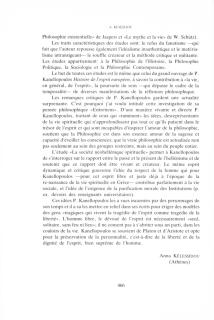
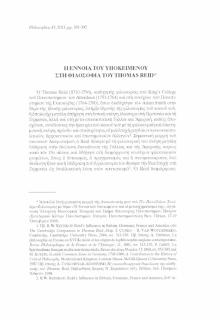
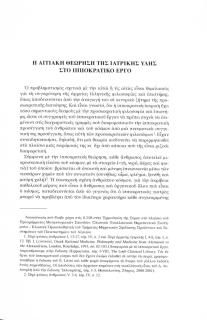
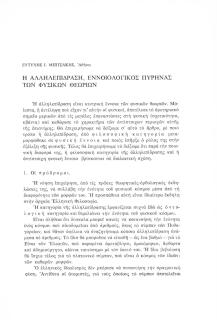
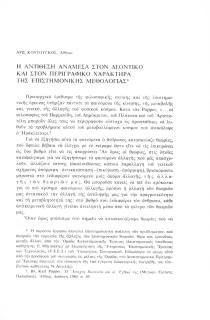
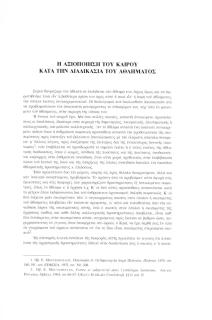
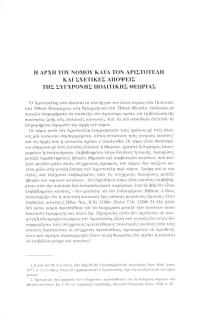
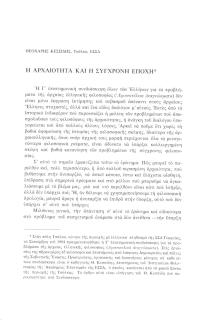
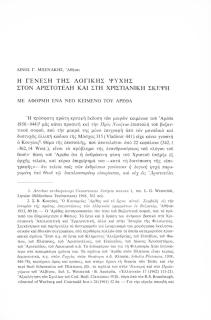
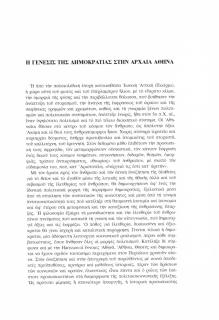
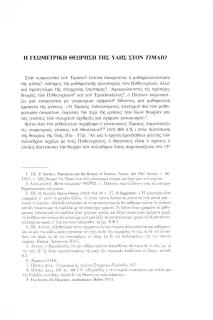
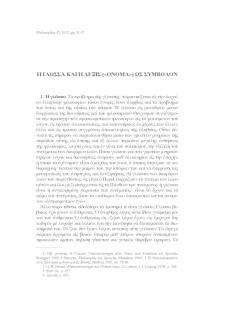 << 10
10 >>
<< 10
10 >>
Total: 4244

Η έννοια του τυχαίου και η μεταφυσική του Παναγιώτη Κανελλόπουλου
Ενότητα: Άρθρα του περιοδικού "Φιλοσοφία"
An attempt is being made in this paper to examine the notion of chance, using the framework of Panayotis Kanellopoulos΄ metaphysics as our main point of departure. Major points of determinism analysis are being examined to indicate its inadequacy per se when it deals with processes of nature as well as with processes of mind, to conclude that its antithesis to indeterminism is being overcome on the basis of probability theory. While the probability theory founds the probable and not the chance event, the existence of chance is being assumed especially by several statistical notions such as "degrees of freedom" taken into account to isolate probability systems from external influences and to solve simultaneous equations related to these systems. Mathematical foundation of chance is being also supported by modern experimental psychology on the processes of mind which, although does not prove directly the existence of freedom in the realm of human understanding, at least it does not renounce it. The thesis is being finally formulated that the...
Η έννοια του υποκειμένου στη φιλοσοφία του Thomas Reid
Ενότητα: Άρθρα του περιοδικού "Φιλοσοφία"
Thomas Reid, the founder of the Scottish philosophy of common sense, is recognized today as one of the most important Scottish philosophers of the eighteenth century whose thought offered an alternative to Humean skepticism, Kantian idealism and Cartesian rationalism. Central issues in his theory of sensation and perception as well as in his theory on personal identity are connected with his criticism of the modern theory of ideas and especially with a refutation of David Hume's philosophical skepticism considered as the logic outcome of Berkeley's subjectivity and of various other trends that dominated philosophy since Descartes. Combining a significant response to the skeptical and idealist views of his days with a robust realism about mind and the world, Reid constructed a theory of human mind and its epistemic operations in a very different way from the usual eighteenth century epistemological theories, arguing that knowledge deriving from the mental process is based on first principles, the so-called common sense beliefs that are comm...
Η αιτιακή θεώρηση της ιατρικής ύλης στο ιπποκρατικό έργο
Ενότητα: Άρθρα του περιοδικού "Φιλοσοφία"
In sharp contrast to the charlatans of Hippocrates' time, who claimed to heal diseases by superstitious practices and rituals, the Hippocratic doctor΄s unwavering requirement was the search for the causes of illness. «One must approach the cause, and of the cause, the source». This perception meant that the doctor had first to locate the cause of the disease, then to deal with it in such a way that healing ensued. For, says the Hippocratic author, «most [diseases] are cured by the same things as caused them». The Hippocratic doctor΄s confidence that a disease and its treatment will invariably have a cause is founded on the scientific nature of this school of medicine.
Η αλληλεπίδραση, εννοιολογικός πυρήνας των φυσικών θεωριών
Ενότητα: Άρθρα του περιοδικού "Φιλοσοφία"
Le present texte constitue un effort de mettre en relief le rôle des interactions physiques dans la formulation des théories physiques. Après une référence à la catégorie de l’interaction dans la philosophie grecque ancienne, on passe à la physique moderne. On montre, comment l’interaction à vitesse infinie, constitua le noyau conceptuel de la mécanique et de la physique classique plus généralement. C’est l’étude de l’interaction électromagnetique qui provoqua, en XIXe siècle, la crise de la physique mécaniste. L’interaction à vitesse finie constitua, à son tour, le noyau conceptuel de la physique rélativiste, et de la théorie de la gravitation d’Einstein. On analyse par la suite comment le quantification des interactions physiques constitua le point de départ et le noyau des théories quantiques. Les caractèristiques de ces théories, incompatibles avec le cadre conceptuel classique, sont marquèes par la discontinuité des interactions. La question de l’unitè du monde physique est finalement abordeè, sous le lumière de l’unitê des interactio...
Η αντίθεση ανάμεσα στον δεοντικό και περιγραφικό χαρακτήρα της επιστημονικής μεθοδολογίας
Ενότητα: Άρθρα του περιοδικού "Φιλοσοφία"
The problem of any theory of science, that is any theory of the history of science, or even more analytically, any theory of change of scientific theories, lies in a contradiction inherent in the nature of scientific methodology. This contradiction is the result of an inevitable interplay between a normative and a descriptive role that scientific methodology (as theory of science) is forced to have while setting up demarcation criteria for science and at the same time trying to be compatible with as much of actual history of science as possible. The normative character of scientific methodology concerns both the (scientific) behaviour of scientists (that is how and how honestly to set up experiments to test their theories) and the structure of theories upon which depends their empirical, verifiable or falsifiable character. A methodology therefore in its normative role demarcates on the basis of such criteria, a specific set out of the bulk of phenomena of the actual history, as genuinely scientific. However the need to allow for a crit...
Η αξιοποίηση του καιρού κατά τη διαδικασία του αθλήματος
Ενότητα: Άρθρα του περιοδικού "Φιλοσοφία"
Δεν υπάρχει περιγραφή
Η αρχή του νόμου κατά τον Αριστοτέλη και σχετικές απόψεις της σύγχρονης πολιτικής θεωρίας
Ενότητα: Άρθρα του περιοδικού "Φιλοσοφία"
If is a commonplace among those defending the rule of law that when we obey the laws in general, we are not subjected to the will of another man and thus we are free. However, laws are enacted, interpreted and enforced by particular individuals who use their power to impose on others their conception of a community's standards regarding common responsibility. Therefore, to insist that we are ruled by laws, rather than by particular individuals or groups, merely conceals the political power of these, by protecting them from challenge and criticism. Although Hobbes suggests that Aristotle has contributed to this conception of political power, Aristotle himself conceives the rule of law as a form of exercise of political power rather than as its substitute. According to Aristotle, the rule of law means the sovereignty of the general rules preferred by those who have the power to enact and interpret the law. Nonetheless, it does not mean that Aristotle conceives the rule of law as a rule of morally correct standards. Therefore, some contempora...
Η αρχαιότητα και η σύγχρονη εποχή
Ενότητα: Άρθρα του περιοδικού "Φιλοσοφία"
Δεν υπάρχει περιγραφή
Η γένεση της λογικής ψυχής του Αριστοτέλη και στη χριστιανική σκέψη. Με αφορμή ένα νέο κείμενο του Αρέθα.
Ενότητα: Άρθρα του περιοδικού "Φιλοσοφία"
Der bis zur Herausgabe der Scripta minora des Arethas von Kaisareia nur aus der Inhaltsübersicht bekannte Brief an Niketas des byzantinischen Gelehrten (850-944) über die Menschwerdung Christi enthält Arethas‘ Stellungnahme zum Problem der Entstehung der Vernunftseele : diese wird vom Gott als vollokommene schon durch die Empfängnis dem Leib verliehen. Dabei wird ausdrücklich die von Aristoteles in De gen. anim. B 3 dargelegte Lehre verworfen, namentlich die Lehre von der Beseelung des körperlichen Produkts in Entfaltungsetappen (Hervortreten der intellektiven Seele nach der vegetativen und sensitiven). Die ins einzelne gehende Kritik der aristotelischen Lehre ist leider bei der handschriftlichen Überlieferung verloren gegangen. Es steht jedoch fest, daß auch die aristotelische Konzeption vom späteren Eintritt des Nous von außen (θύραθεν) in den Leib von Arethas verworfen wird, sofern diese Konzeption die Präexistenz der Seele bedeutet. Was die christliche Auffassung betrifft, so steht Arethas mit seiner These vom Eintritt der Vernunftsee...
Η γένεσις της δημοκρατίας στην αρχαία Αθήνα
Ενότητα: Άρθρα του περιοδικού "Φιλοσοφία"
Based on the belief that all men are equal before law and by praising the uniqueness and freedom of human spirit, the Athenians gradually developed the ideal Democracy. The source of inspiration was King Theseus who, in the 13th century B.C. incorporated all towns and communities of Attica into one big state thus creating the first State in human history. He created the first «Agora», the Parliament of Areos Pagos and the Assembly of the Commons. The citizens, depending on their lineage, were classified in fraternities and fanctions. Eusebius provides us with information about the political evolution in Athens; His chronicles provides us with lists of: a) 17 hereditary Kings until the 11th century B.C. b) 13 life archons up to the year 776 B.C. The nobles became very powerful and they owned common property, c) 7 elected officials (archons) who served for 10 years. From 681 B.C. and onward prevailed the «co-reign» of 9 aristocrats: A President of the Republic, a King-High Priest, a war Archon and 6 legislators. Nobility was the first class,...
Η γεωμετρική θεώρηση της ύλης στον Τίμαιο
Ενότητα: Άρθρα του περιοδικού "Φιλοσοφία"
Δεν υπάρχει περιγραφή

